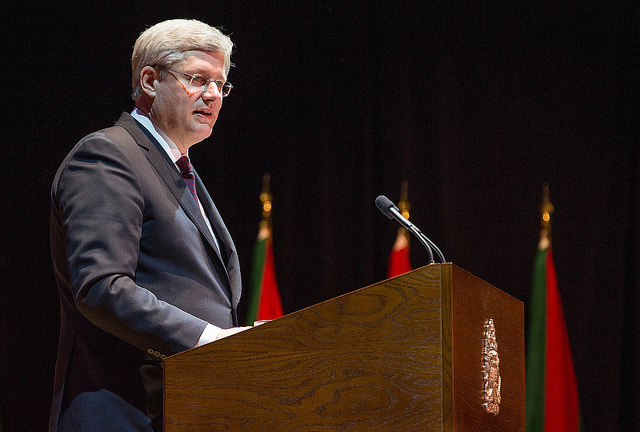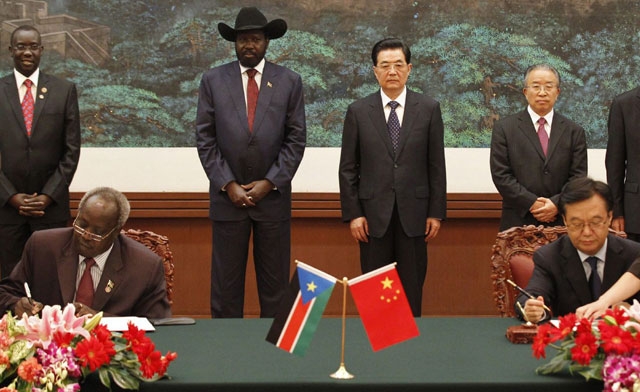Canada has long prided itself on its commitment to global development and humanitarianism. According to a 2014 publication by the Canadian Security Intelligence Service (CSIS), Canada has been one of the most reliable contributors to development efforts abroad, being one of the founders of the Development Assistance Committee, a forum within the Organization for Economic Cooperation and Development (OECD). The report further celebrates Canada for having provided over $5.6 billion in official development assistance (ODA) in 2012, putting it behind only the United States, the United Kingdom, Germany, France, and Japan. Given that all of these countries are wealthier than Canada, such contributions paint a rosy picture that suggests Canada is a leader in the realm of international development.
Before Canadians pat themselves on the back, however, they should consider other statistics that are not mentioned in the CSIS report. In 2013, Canada only disbursed $4.9 billion in ODA, which constitutes a decrease of 11.4% in real terms from the previous year. While Canada was the sixth largest donor of ODA in 2012, it ranked ninth in 2013. Furthermore, as a proportion of its Gross National Income, Canada’s ODA budget fell to 0.27% in 2013 and then to 0.24% in 2014, which is drastically lower than the 0.7% target recommended by the United Nations. In fact, no other large donor’s foreign aid spending has plummeted more than Canada’s except for Portugal, which has experienced tremendous economic hardship caused by a major recession that ended in 2014. While much of the world can boast about the fact that ODA reached an all-time high in 2013, Canada’s spending has moved in the opposite direction – downward. According to Professor Stephen Brown at the University of Ottawa, Canada is balancing its budget “on the backs of the poor.”

Some might point out that the quantity of foreign aid may not be as important as the quality. Indeed, Finance Minister Joe Oliver’s latest budget has established what is known as a Development Finance Institution (DFI). According to the 2015 Economic Action Plan, DFIs provide “financing, technical assistance and business advisory services to the private sector to facilitate and encourage investments in developing countries.”
Proponents of such institutions—which have already been implemented in all other G7 countries—claim that they are needed to provide businesses with the funding sufficient to offset the high risks involved with operating in developing countries. Furthermore, DFIs allow states to pursue international development projects without putting a strain on the public purse by specifically investing in businesses that will make a profit, giving the government a return on its investment. For example, the UK’s CDC Group has derived enough profit from its investments that it has not had to draw from public funds in 15 years.
While the idea that global poverty can be solved while boosting the profits of rich countries and corporations alike is certainly attractive, many experts remain sceptical of DFIs. A recent report by Oxfam indicates that private sector investments by the World Bank were associated with rampant exploitation, including cases of sexual assault, land grabbing, and other abuses stemming from a lack of accountability among private actors. Moreover, a study by the European Network on Debt and Development reveals that a large amount of DFI investment goes to the financial sector, which often lacks development expertise compared to community-based organizations. It is also more difficult to ensure that investments made by the financial sector are transparent and effective. By making profit its highest priority, DFIs often miss the point of development altogether, funneling money to more lucrative areas at the expense of those that are most in need.
If Canada is going to have a DFI, policymakers and lawyers must ensure that it complies with the Official Development Assistance Accountability Act (ODAAA). The ODAAA legally binds ODA initiatives into prioritizing poverty reduction while respecting human rights and taking into account the perspectives of the poor. Given this, the Canadian DFI must ensure that its investments lead to poverty alleviation rather than simply advancing the interests of private businesses. Since the Conservative government has ignored aspects of the ODAAA in the past, it needs to be especially careful as it moves forward with its new DFI.




